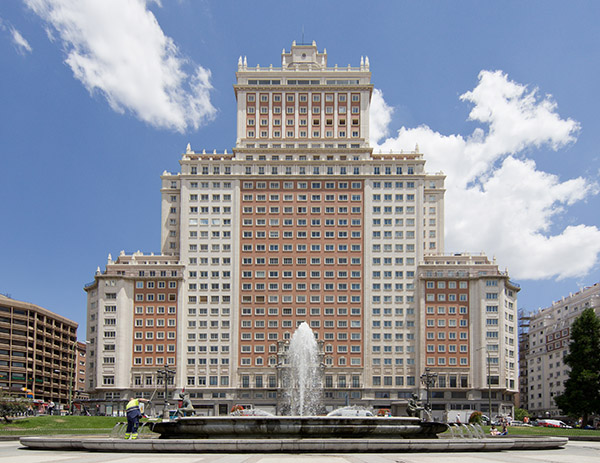Real estate project draws controversy
Updated: 2015-07-28 06:26
By EMMA GONZALEZ/ZHONG NAN(China Daily)
|
||||||||
 |
|
The Espana Building, acquired by Dalian Wanda in June 2014, is a Madrid landmark in the commercial heart of the capital. [CARLOS DELGADO/CHINA DAILY] |
Chinese property giant Dalian Wanda is at the center of a fiery public and political debate in Spain over its plans to demolish an iconic building in central Madrid.
In June last year, the property group acquired the Espana Building for 265 million euros ($297 million) from banking corporation Santander Group.
The Espana Building, which occupies an entire city block, is a Madrid landmark in the commercial heart of the capital.
The sale of the historic 25-story skyscraper, which was Europe's tallest building when it opened in 1953, was completed on the sole condition that the facade and the side walls of the building remained intact.
The building has been empty since 2006 due to its poor condition and high maintenance costs. Since then, it has heavily deteriorated and is now in desperate need of refurbishment.
"Wanda's plan for the building includes a luxury hotel, a shopping center and the construction of exclusive residential properties", said the group at the time of the acquisition.
The company, together with private Spanish companies, will also participate in the improvement of the Espana Square opposite the building. The new architectural design, with a planned investment of 80 million euros, will reduce car traffic, expand green spaces and increase pedestrian areas. The project will also add 100 underground parking places.
Wanda's plan was initially welcomed by local authorities because it proposed to revitalize the area and generate about 3,400 construction jobs.
However, things turned sour for Wanda after the announcement that the developer might need to tear down the whole building for safety reasons and then rebuild the facade stone by stone.
Wanda executives noted that given the poor state of the building, keeping just the facade and the side walls could be a potential risk. No Wanda officials were available to comment.
Cristina Guardia, a Spanish architect working for a Barcelona-based studio, said: "It is a very complicated project that needs a very exhaustive structural calculation. I personally do not think a total demolition is needed. An interior restructuring could be enough to keep the facade."
The project is also facing stricter conditions from a new city council.
Madrid's new mayor, former judge Manuela Carmena, has started a campaign to scrutinize the approval of big building projects during the former conservative administration.
Local media reported that Wanda top executive Michael Qiao asked for a private meeting with the new council officials to discuss the construction project.
Following the meeting, it was announced that Wanda executives and local officials from the urban development department will set up a special commission to discuss the architectural details of the project.
The spokesman for the council, Antonio Miguel Carmona, said, "The commission will discuss how to save Wanda's big investment in Madrid on condition that the project benefits the citizens and does not cost city hall a single euro."
The local government will also consult citizens and environmental groups on Wanda's plans to demolish the building.
The Espana Building is not the only Wanda project in store for Madrid. The company is currently considering another real estate megaproject in the capital that could attract a larger investment.
"Although Wanda has not given concrete details, the new investment could be 10 times bigger than the disbursement of the Espana Square operation," Carmona said at a news conference.
Nonetheless, the outcome of the intense debate over the future of the Espana Building could complicate future investment plans for the company in the Spanish capital.
Although tearing down old buildings is a common practice in China, the treatment of protected sites is very strict under European legislation.
He Jingtong, a professor of economics at Nankai University in Tianjin, does not believe that this debate will have major negative consequences for Chinese investments overseas, but he said it is still a sign that Chinese companies need to do their homework when going global.
"As many nations need to rely on Chinese investment, it will not affect Chinese operations in the European Union," he said. "However, China needs to learn how to organize international media campaigns better. Other challenges to tackle include limited knowledge of overseas commercial and legal environments."
Contact the writers through zhongnan@chinadaily.com.cn
- Tian'anmen gets early makeover for grand parade in September
- China eyes deepened cooperation with overseas NGOs
- Beidou navigation system moves a step closer to global coverage
- Integration will bring opportunity for overseas talent
- Ten photos you don't wanna miss (July 20-26)
- Sansha city, three years after its founding
 Elvis Festival pays tribute to the King of Rock 'n' Roll
Elvis Festival pays tribute to the King of Rock 'n' Roll
 Four-color rice turns paddy field into artwork
Four-color rice turns paddy field into artwork
 Images capture modern life of a warrior monk
Images capture modern life of a warrior monk
 The world in photos: July 20 - 26
The world in photos: July 20 - 26
 Amazing landscape of China in white and black
Amazing landscape of China in white and black
 Across America over the week (July 17- July 23)
Across America over the week (July 17- July 23)
 Unusual but true: 'Love' conquers all
Unusual but true: 'Love' conquers all
 Six dead as rainstorms wreak havoc in China
Six dead as rainstorms wreak havoc in China
Most Viewed
Editor's Picks

|

|

|

|

|

|
Today's Top News
Beijing condemns Somali attack, mourns deaths
China eyes deepened cooperation with overseas NGOs
Monster Hunt breaks Chinese box office record
Olympic bid panel cites city's merits
Astronomers discover most Earth-like planet yet
Seattle Chinatown leader killed in shooting
Flight details of Obama's Kenya trip leaked
2 killed, several injured in Louisiana theater shooting
US Weekly

|

|






